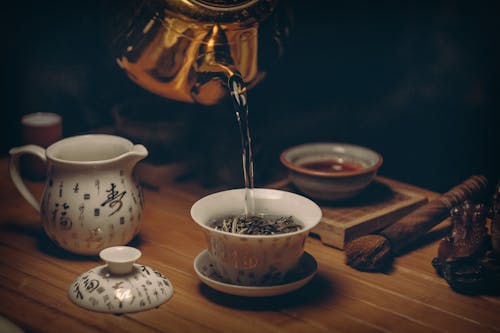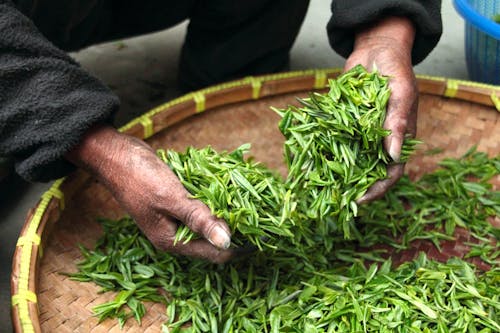Ten interesting facts about Tea
 |
| Peppermint Tea on Teacup |
But like with all things in this world, even tea doesn’t come without its fair share of facts. So before you s tart to believe everything you hear and read about tea, here are the top 10 facts surrounding tea debunked!
Is there any truth attached to these tales?
Nobody knows how and where these facts resurfaced. Some could be part of cultural beliefs, some superstitious notions and some facts are purely related to tea etiquettes that are now redundant. Some could be based on partial truths, while others have no facts to support them. That’s probably the reason it’s difficult to separate the truth from fiction, or even to spot the facts in the first place!
There have been many scientific research studies across the globe conducted ever since tea became such a popular beverage – after all, science wants to make its own contributions to the culture of tea, like with everything else!
So, if you are a true tea lover and are worried about some of the facts you have come across, we tell you which ones are not a cause for concern.
Fact 1: It is best to have your tea black, with no additives for best health benefits
 |
| Pouring Hot Water on Cup of Tea |
Now we do agree that tea does taste great on its own, especially if you are going to choose a delicate white tea or a nice organic green tea. But that doesn’t mean you have to brave a cup of bitter black tea or even oolong tea without any milk and lime in order to attain the health benefits these tea varieties have to offer!
Adding milk to your tea will not alter the levels of antioxidants in it, though it could not be so good for heartburn if you are prone to acidity. Also, adding a squeeze of lemon juice or lime juice will preserve the flavonoids in your tea, so by all means go ahead and do it. The great additive for your tea is honey, in special if you prefer your tea green, black or white.
Fact 2: Herbal tea is best for me if I have anxiety
 |
| Herbal Tea on Basket |
Good herbal tea may calm your sense, but the truth is that it’s not tea at all! Tea comes from the plant Camellia sinensis. The herbal tea are, really, is fusions that make use of flowers, fruit extracts and sometimes barks of other medicinal trees and plants. Mostly it is no ‘tea content’ in them, so they do not really qualify for tea in the true sense of the word. The technical term to describe these ‘mock teas’ is tisanes. Some do really contains poly-phenols found in tea but not the caffeine.
Fact 3: Peppermint tea will be beneficial for me if I have stomach problems
One cup of light tea in-fused with natural herbal that aid in digesting is good for the tummy, but peppermint might not always be the right choice. This is especially true if you suffer from gastrointestinal reflux disease, or GERD, or in layman’s terms —recurrent heartburn. India’s Ginger tea may be a better choice for you if you have gastric problems.
Fact 4: Tea has unlimited shell life because it’s dried leaves
All things come in a pack, tea too has a shell life and will go expire. The time is under a year, lesser for delicate teas like green tea and white tea. After this time, the level of catechins or antioxidants in tea start to decrease, becoming less potent.
In fact, to get the most benefit from your tea, make sure you remove it from the pack and keep it in an airtight container so that the humidity not affect its chemical composition, and yes, finish the pack within 6 months to be on the safe side. If you want stronger teas, do refer to the pack before you throw it away after transferring to an airtight container to know what its shell life is like.
Fact 5: You cannot make good tea using teabags
It’s amazing how some people think that tea bags are actually made from the dust that falls down on tea factory floors, and hence if you want a good tea nothing will do but retail tea leaves! The tea bags that are to blame for the badly boiled pot you have on your hands, it’s probably the temperature you boiled them to!
Yes you can get a real good cup of tea from tea bags, as long as you choose the quality well, ensure that the steeping time is perfect and you use clean fresh water for brewing.
Find around, you will get that some companies go that extra mile and sell actual rolled leaves and bits of dried fruit with flower petals in tea bags that make a better cup than loose leaves!
Fact 6: If I drink tea I don’t really need to worry about free radicals
Now this one is stretching the truth a bit too far. Yes, tea affects your longevity and it does protect the cells of your body and heals them, but you need to also ensure that you maintain a healthy lifestyle with a balanced diet and regular exercise to see any marked improvement. If you are a regular tea drinker, you are consuming a good amount of antioxidants per day to fight the harmful effects of free radicals. But if you leave your body to constant prolonged attack from free radicals by smoking, drinking, eating fast food and not exercising, please don’t expect tea alone to do the task of elongating your life!
Fact 7: Only green tea is rich in antioxidants
Here is a catch – all kinds of tea DO have antioxidants, but the levels differ from tea variety to variety. All tea will come from the same source, but because each kind is processed differently, the levels of antioxidants in each vary. Green tea is wilted and steamed and hence higher in antioxidants, while oolong and black teas are processed by fermenting and crushing and hence the levels of antioxidants might be reduced.
One thing you can be assuring of – all tea variety doing pack a healthy dose of antioxidants. So it’s better to choose a type you like and become a regular drinker, rather than to not give tea a try because green tea alone didn’t appeal much to your palate.
Fact 8: I don’t need antioxidants from tea because I eat fruits and vegetables
Fruits and vegetables do contain anti-oxidants, but did you know that a single cup of tea has more anti-oxidants in it than four servings of fruits and vegetables? If you are trying to keep your caloric intake lower, drinking a cup of tea will do you more benefit than wolfing down a whole plate of salad.
Vegetables and fruits are great because they have fiber and must always be a part of your nutrition. We don’t say that tea can replace these food groups, but remember that fruits and veggies also have sugar, starch and carbohydrates. Tea has none of that, if you decide a cup of un-sweetened tea is better for your daily dose of anti-oxidants or not!
Fact 9: If you want to avoid caffeine, simply drink white or green tea
Yes, black tea does have caffeine, but it’s a Fact that white tea and green tea don’t! Mostly tea comes from CAMELLIA Sinensis, and that means all of them have caffeine in them. While the flavors could be lighter, milder and more delicate, it doesn’t mean that green tea, oolong tea or white tea has no caffeine.
Fact 10: Tea is not good for those with mold allergies
The tea was fermented while processing, but that doesn’t mean it has yeast spores in it! Mostly the tea process is uses high temperature, especially if you talk of black tea. The high temperatures used kill all fungi, and that is why if you buy a packet of freshly packed tea leaves you have no need to fear allergies.
However, any tea leaves that have been improperly stored in a non-airtight box can be exposed to mold and will have a musty smell. This holds true for any tea variety – black, green, oolong or white tea. Probably the reason this Fact came in to existence in the first place could be because experts believe that those with allergic tendencies should avoid Pu-erh tea because it is aged making use of natural yeast for its distinct earthy flavor. All other kinds of tea are safe for mold allergy sufferers, so don’t deprive yourself.

0 comments:
Post a Comment